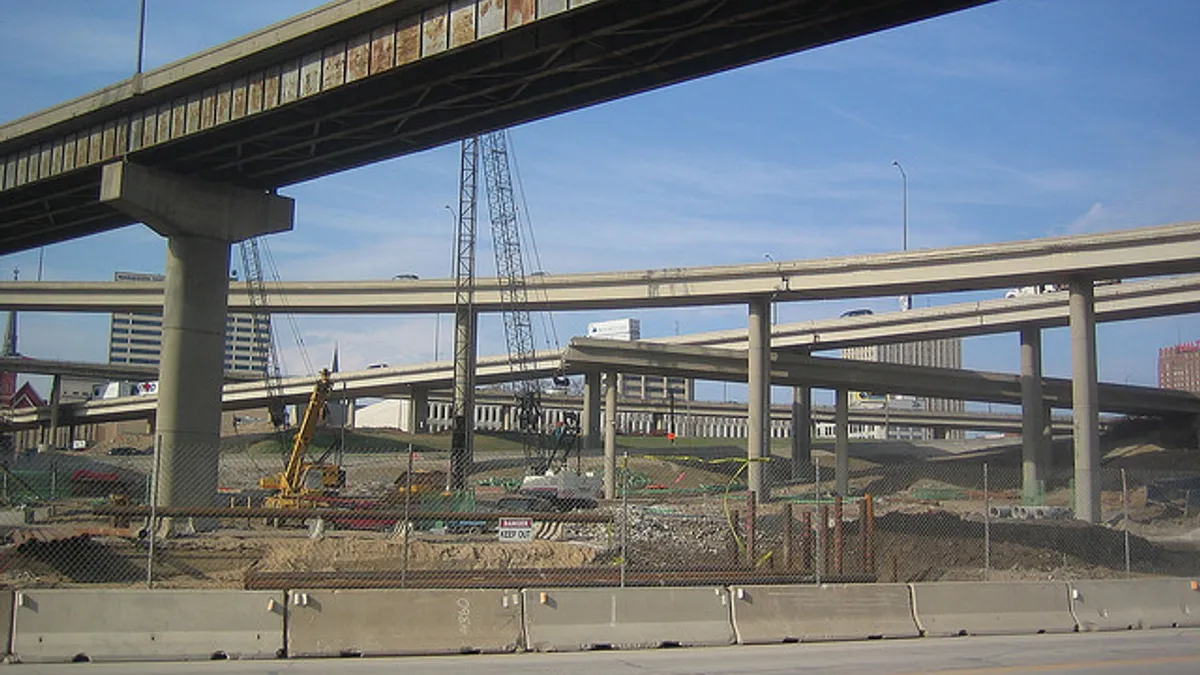Dive Brief:
- Newly released documents provide details into some of the projects that have been expedited by President Donald Trump's executive order directing federal government agencies to waive environmental regulations and streamline infrastructure projects in order to hasten the economic recovery from the COVID-19 pandemic.
- In light of the June 4 executive order the Interior Department is considering exemptions to key provisions of the Endangered Species Act and the National Environmental Policy Act for more than 60 major projects, newly released documents show.
- The projects under consideration include highway construction, fossil fuel extraction facilities and pipelines, energy storage, mining, water delivery and wildfire mitigation projects.
Dive Insight:
The president's order directs all federal agencies to invoke their emergency authority to bypass the Endangered Species Act, Clean Water Act, National Environmental Policy Act and other environmental laws to approve projects as fast as possible.
The order effectively does away with the responsibility for federal agencies to abide by environmental regulations in order to speed up public works projects that will create jobs. Without intervention, according to the order, the United States faces "the likelihood of a potentially protracted economic recovery with persistent high unemployment."
The list of projects being considered for expedited review was obtained by the Center for Biological Diversity under a a Freedom of Information Act request and a subsequent federal lawsuit. More than 60 projects were detailed in an attachment to a letter from Assistant Interior Secretary Katherine MacGregor to White House economic advisor Larry Kudlow. They include:
- The Mountain Valley natural gas pipeline in Virginia.
- Storm levees and wetlands restoration initiatives in Louisiana.
- The Lake Powell water pipeline in Utah.
- U.S. Route 58/220 Bypass to the North Carolina state line feasibility study.
- New Jersey Back Bays coastal storm risk management feasibility study.
- I-526 Low Country Corridor West improvements in South Carolina.
- I-495/I-270 managed lanes study in Maryland.
- I-285 Top End express lanes in Georgia.
- An oil and gas project in Converse County, Wyoming.
- The Jordan Cove liquefied natural gas terminal and Pacific Connector gas pipeline in Oregon.
"The department continues to look for and implement efficiencies that will help strengthen the economy and return Americans to work, while providing appropriate protections for public health and safety, natural resources, and the environment," MacGregor wrote.
The Trump administration's commitment to lessen environmental regulations that slow infrastructure projects received the support of major construction industry associations. Nick Goldstein, vice president of regulatory and legal issues for the American Road & Transportation Builders Association (ARTBA), praised the president's executive order.
"ARTBA is supportive and believes the [executive order] will use existing statutory authority to help spur infrastructure projects during a time of national emergency," Goldstein said.
Associated Builders and Contractors (ABC) and Associated General Contractors of America (AGC) welcomed President Trump's order as well.
"By emphasizing the need to improve our country’s crumbling infrastructure and creating additional flexibility," said Kristen Swearingen, ABC vice president of legislative and political affairs, "the construction industry will be better able to plan and execute even the most complex projects while safeguarding the health of our workforce, communities and the environment.”
Environmental groups such as the Center for Biological Diversity strongly oppose the measure, saying that many of the projects on the Interior Department list will increase the country's reliance on fossil fuel while ignoring environmental harms.
“These documents show that dozens of dangerous projects could be rubber-stamped without any environmental review,” said Brett Hartl, government affairs director at the center, in a press statement. “We’ll fight every one of them in court if need be to stop this administration’s relentless assault on our environment."















